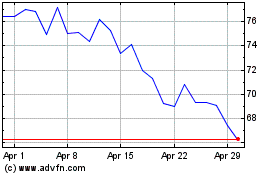By Parmy Olson | Photographs by Betty Laura Zapata for The Wall Street Journal
LONDON -- A four-woman technology-advocacy group that forced the
British government to scrap a controversial algorithm for
processing visas and led a public backlash over a tool for
predicting high-school grades now is taking on Facebook Inc. and
Uber Technologies Inc. over worker rights.
The group, named Foxglove after the European flower that, the
founders note, can act as both poison or cure, has become a sudden
force in the continent's tech circles. Its recent high-profile
success in the U.K. over the past year and a half has given it a
global platform unusual for such a small group.
Similar groups have sprung up in Europe and the U.S. to
challenge what they view as the rising power of Silicon Valley,
with the advocacy largely centered on privacy issues. Foxglove has
cut a different path, taking aim at government-created algorithms
that increasingly make decisions in civic areas like education and
immigration.
"There was almost nobody in civil society doing anything about
that," said one of Foxglove's founders, Cori Crider, a 39-year-old
Texan. "What we're interested in is this change in the way power
has been exercised, almost hiding a bunch of contestable policy
judgments behind a technical veneer."
A nonprofit with a budget this year of just over a half-million
dollars, Foxglove is now looking into tech-worker rights. Its
founders came together in 2019 over weekend brunches at their homes
across London. Along with Ms. Crider, the group's leaders are Rosa
Curling, a 42-year-old British attorney, and Martha Dark, a
33-year-old operations manager for human-rights groups. All three
had worked on broader human rights issues. Last year, Hiba Ahmad,
27, a researcher, joined.
One of Foxglove's biggest actions came last year, after the
pandemic forced the cancellation of Britain's nationwide
high-school exams, which are key to securing places at the
country's best universities. The U.K. government devised an
algorithm to predict the grades students would have achieved, based
on elements such as past performance and their school's track
record.
Foxglove represented Curtis Parfitt-Ford, a straight-A student
in London who said the algorithm might rank some state-funded
schools lower than the country's private schools. As opposition to
the plan mounted, Foxglove launched its first legal challenge on
Mr. Parfitt-Ford's behalf, steered him to press interviews and
suggested he set up a petition which collected roughly 250,000
signatories.
The government dropped its plan. Ofqual, the regulatory body
that presides over the testing and devised the algorithm, declined
to comment. At the time, it defended the tool as fair, but later
apologized for causing distress. Instead, it allowed teachers to
provide predictive grades.
Foxglove previously had targeted another government-created
algorithm, which decided whether certain immigrants could enter the
country. In its most decisive win, the group sued the government,
alleging the tool used the nationality of applicants to unfairly
assess the merits of their applications.
The challenge represented the first attempt to subject an
automated system to judicial review in Britain, Foxglove said.
Before the case made it to court, the government said it would halt
use of the algorithm and review its visa-filtering systems for
bias. In its legal response to Foxglove, the British government
said the changes didn't necessarily mean it accepted allegations of
bias.
Ms. Crider said that in some cases, powerful algorithmic tools
are technologically unsophisticated. "The visa algorithm we knocked
over was one step up from a spreadsheet," she said.
The group's work has caught the eye of industry leaders. "The
Foxglove team have shown that a few fearless, nimble lawyers can
have outsized impact in challenging tech giants," said Harry
Briggs, a managing partner at Omers Ventures, the technology
investing arm of Canadian pension fund Ontario Municipal Employees
Retirement System.
Foxglove's work on rights issues for tech workers is garnering
attention outside its home turf.
The group has built a network of current and former Facebook
contract workers with whom it discusses potential legal action,
lobbying, unionizing, or provides legal advice and support.
Many of those workers allege their content-review work for the
social-media platform has caused psychological injury. Their work
involves reviewing content that might be considered harmful or
inappropriate, like terror propaganda or pornography. Eight of
those workers have started legal proceedings against Facebook in
Ireland, alleging inadequate support and psychological
injuries.
Ms Crider said the workers weren't given adequate break time and
were pressured into making hasty decisions about content.
A Facebook spokeswoman said that its content reviewers could
take breaks when needed, with no time limits, and weren't pressured
to make hasty decisions.
Foxglove arranged for two content reviewers to meet Ireland's
deputy prime minister, who pledged a review of the issue. It also
successfully petitioned the Irish government to hold a
parliamentary hearing about the issue in Dublin. That hearing took
place Wednesday.
The group also is working with Uber drivers in London, where a
Supreme Court ruling recently entitled them to minimum wage. Uber
has said it would pay minimum wage for drivers who take fares, but
not while they await fares, an interpretation Foxglove says is too
narrow. The group set up a drivers petition and is laying the
groundwork for a potential lawsuit over the enforcement of the
Supreme Court ruling.
An Uber spokesman said Foxglove's interpretation of the
minimum-wage ruling could require it to ask drivers to work in
shifts. It would also leave Uber open to abuse, the spokesman said,
if drivers simply keep their app open for potential fares while not
working.
Chi Onwurah, a member of Parliament overseeing science and
technology for Britain's opposition Labour Party, said Foxglove was
helping fill a gap. "Having sat in many meetings with technology
companies, I know they have lots of lawyers," she said. "Ordinary
people need lawyers, too."
Write to Parmy Olson at parmy.olson@wsj.com
(END) Dow Jones Newswires
May 15, 2021 10:14 ET (14:14 GMT)
Copyright (c) 2021 Dow Jones & Company, Inc.
Uber Technologies (NYSE:UBER)
Historical Stock Chart
From Mar 2024 to Apr 2024

Uber Technologies (NYSE:UBER)
Historical Stock Chart
From Apr 2023 to Apr 2024
